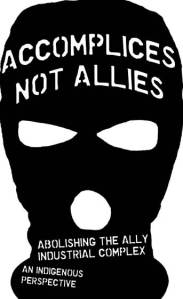The Indigenous Vote | Blog | University of Manitoba Press
The author of Elder Brother and the Law of the People on Indigenous participation in the 2015 federal election.
Source: The Indigenous Vote | Blog | University of Manitoba Press
13 Observations in 3 Parts
Brilliant and a must-read!
Needs to be read!
Indigenous Action Media, May 4, 2014
This provocation is intended to intervene in some of the current tensions around solidarity/support work as the current trajectories are counter-liberatory from my perspective. Special thanks to DS in Phoenix for convos that lead to this ‘zine and all those who provided comments/questions/disagreements. Don’t construe this as being for “white young middle class allies”, just for paid activists, non-profits, or as a friend said, “downwardly-mobile anarchists or students.” There are many so-called “allies” in the migrant rights struggle who support “comprehensive immigration reform” which furthers militarization of Indigenous lands.
View original post 2,518 more words
Elsipogtog Everywhere
Two Worlds Colliding
Directed by Tasha Hubbard (Cree).
“This documentary chronicles the story of Darrell Night, a Native man who was dumped by two police officers in a barren field on the outskirts of Saskatoon in January 2000, during -20° C temperatures. He found shelter at a nearby power station and survived the ordeal, but he was stunned to hear that the frozen body of another Aboriginal man was discovered in the same area. Days later, another victim, also Native, was found.
This film is an inquiry into what came to be known as Saskatoon’s infamous “freezing deaths” and the schism between a fearful, mistrustful Aboriginal community and a police force that must come to terms with a shocking secret.” http://www.nfb.ca/film/two_worlds_colliding/
We wrote this last year, but wanted to share this again before we released our next post.
Dear Reader:
Chances are you are not a white man if you are reading this or taking it seriously. However, we encourage you to take it upon yourself to compel at least one abusive white activist man you know to read this. You know who he is /they are. Take this as a challenge, but if you can’t we understand. We wrote this list because we’ve been abused for so long by some white activist men, particularly in doing Indigenous solidarity work. This list is just a beginning. It does not capture all our critiques, but it’s a humble effort at creating that space where we could let it all out. Not that we haven’t confronted these particular white ‘radicals’, but, nothing happened. We remained as hysterical, hyper-sensitive white women and women of color.
To read more about us and our intentions for this space and contact info please go…
View original post 1,602 more words
The Problem with “Privilege”
From the brilliant scholar-activist, Professor Andrea Smith:
The Problem with Privilege
by Andrea Smith
For a much longer and detailed version, see my essay in the book Geographies of Privilege
In my experience working with a multitude of anti-racist organizing projects over the years, I frequently found myself participating in various workshops in which participants were asked to reflect on their gender/race/sexuality/class/etc. privilege. These workshops had a bit of a self-help orientation to them: “I am so and so, and I have x privilege.” It was never quite clear what the point of these confessions were. It was not as if other participants did not know the confessor in question had her/his proclaimed privilege. It did not appear that these individual confessions actually led to any political projects to dismantle the structures of domination that enabled their privilege. Rather, the confessions became the political project themselves. The benefits of these confessions seemed to be ephemeral. For…
View original post 3,897 more words


